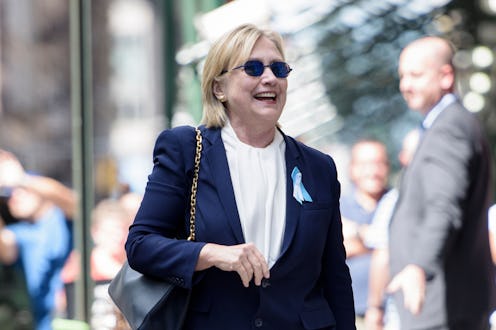News
What Would (Hypothetically) Happen If Clinton Left
While it's difficult to give any consideration to the the right-wing implication that Hillary Clinton may be too ill to fulfill her Democratic nominee/presidential duties, evidenced by her cough while on the campaign trail the past few weeks and her shaky appearance at the 9/11 memorial Sunday, she's now been diagnosed with pneumonia by her doctor and is resting. Though it's more than likely she'll recover in a week or two, questions surrounding her long-term health have since swept the mainstream media. Now, some people may be wondering what would happen if Clinton dropped out of the race.
Clinton could be replaced as the Democratic nominee only if she herself decides to drop out, according to The Telegraph. In that case, according to the Democratic National Committee's Charter and Bylaws:
A special meeting to fill a vacancy on the National ticket shall be held on the call of the Chairperson, who shall set the date for such meeting in accordance with the procedural rules provided for in Article Two, Section 8(d) of these Bylaws.
Basically, the DNC would call a meeting and party officials would cast a vote for their preferred candidate. The Telegraph reports that Vice Presidential candidate Tim Kaine would remain the VP pick — unless he was voted by a majority of the party officials as the new nominee. However, the more likely case would be that someone like Bernie Sanders or Joe Biden (more likely Biden) would be nominated for the top slot.
However, the process doesn't end after a new nominee is chosen by the DNC. The replacement would still need to get onto the election ballot. According to Ballotpedia, states have different deadlines for the parties to register their candidate for the general election, depending on circumstances like absentee and early voting. Late September is when it becomes a bit more tricky to get a nominee on a ballot. That said, there would be a chance that courts would overlook deadlines in favor of having both Republican and Democratic parties represented on the ballot, points out Ballotpedia. It offers up an example of when the New Jersey Supreme Court in 2002 allowed Democrats to replace a U.S. Senate seat nominee 15 days after the deadline. The later a presidential nominee drops out, the harder it is to get the new nominee cleared in time for voters to get the chance to vote.
It's a little more time consuming to go through the courts, but overall probably manageable. Unless, of course, Republicans file lawsuits to uphold state laws and not make an exception for the new nominee. Which, honestly, wouldn't be that surprising from the GOP during this election cycle if things headed that way.
Regardless, what will most likely happen is Clinton will rest for a week or so to shake off her pneumonia before hitting the trail once again. After that, the process of selecting a new Democratic candidate will barely be relevant, and we can all move on to the general election already.
